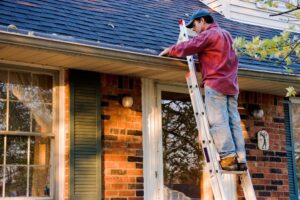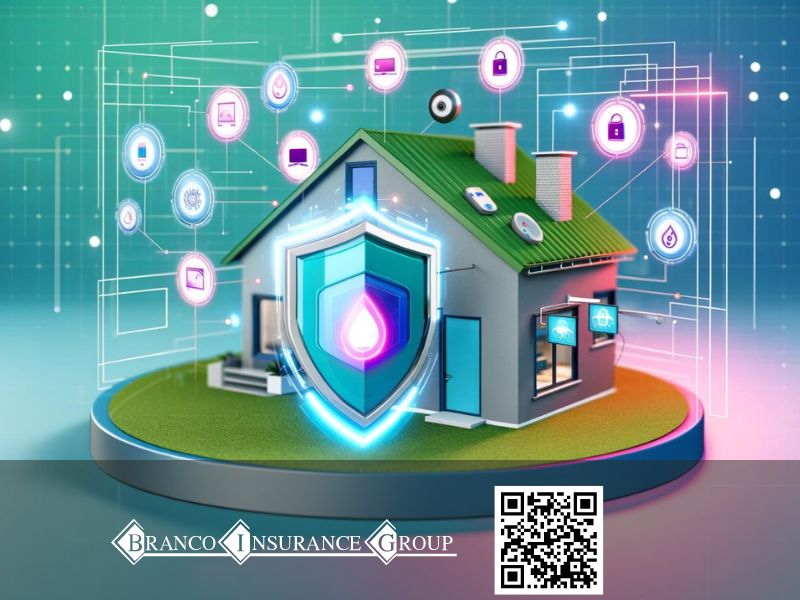
Why Regular Gutter Cleaning is Essential
Your home’s gutters play a crucial role in protecting your property from water damage. They channel rainwater away from your roof, walls, and foundation, preventing

For many homeowners, smart homes are no longer just a futuristic novelty—internet-connected devices are becoming mainstream. As of 2021, over 35 million American households had embraced smart home technology, using it to increase efficiency, add convenience, and bolster home security. But with all the benefits come new risks and considerations that homeowners insurance needs to address. Finding the right smart home insurance protection can be tricky, but this guide covers the key factors in insuring modern, connected abodes in the age of the Internet of Things (IoT).
A smart home integrates appliances, security systems, lighting, and more into one cohesive network that can be monitored and controlled remotely, often via a mobile app. From smart thermostats and locks to leak sensors and security cameras, connected devices communicate real-time data and alerts about a home’s status.
For insurance companies, these innovations are a mixed bag. On one hand, smart home tech can help reduce risks and claims through preventative warnings—for example, a water sensor catching a leak before major flooding damage occurs. However, insurers need to adapt to covering higher home values thanks to expensive devices, while addressing new data privacy concerns.
Overall though, the insurance industry sees big potential in smart homes. Let’s explore the key impacts:
Smart home devices help mitigate hazards and accidents before they become serious issues. For instance, a smoke detector alert can allow homeowners to address a small kitchen fire before it spreads. This preventative capacity means fewer and smaller insurance claims.
The data smart homes generate, from occupancy patterns to appliance health metrics, offers insurers valuable risk insights they’ve never had before. This allows them to price policies more accurately based on a home’s unique characteristics.
Thanks to smart home data, insurers can now offer usage-based insurance —premiums tailored specifically to each customer’s precise behaviors and home analytics, rather than relying solely on proxies like credit scores and demographics.
When accidents do happen, IoT sensor records help verify claims quicker by providing detailed incident timelines and forensic evidence about root causes.
As homes get “smarter,” their rebuilding costs rise to account for damaged smart devices and infrastructure. Policies must adapt higher limits and electronics coverage to fully cover these emerging connected abodes after major losses.
Table 1: Common Smart Home Discounts
Smart Device | Risk Mitigated | Potential Premium Discounts |
Water Sensors | Water damage from leaks/pipe bursts | Up to 13% (Hippo) |
Security Systems | Theft, property damage | Up to 5% (Allstate) |
Smart Smoke/CO Detectors | Fire damage | Varies by insurer |
Smart Thermostats | Energy efficiency improvements | Varies by insurer |
Smart Locks | Unauthorized entry | Varies by insurer |
Home insurance companies offer incentives and discounts for smart devices that reduce risks and claims. Which devices specifically influence premiums and coverage?
Water damage makes up a huge portion of homeowners insurance claims. Smart leak detectors provide an early warning to prevent burst pipes from flooding properties. Top insurers like Hippo, Farmers, and Lemonade offer discounts for installed water sensors.
Smart cameras, motion detectors, and centralized professional monitoring alert homeowners about break-ins and record evidence to confirm claims details later. Insurers such as Allstate give up to 5% off premiums for select brands like SimpliSafe and Canary.
Smart smoke and carbon monoxide alarms that instantly alert fire departments reduce the extent of fire damage claims by getting first responders to the scene quicker. Amica and Farmers give policy discounts to homeowners with these connected detectors.
Niche sensors that detect broken glass, temperature/humidity changes, or major vibrations indicating structural damage can also score discounts. However, these devices tend to only appeal to homeowners with specialized concerns about vulnerabilities like pipe bursts for expensive art collections.
Promotions around smart devices come from both traditional and InsureTech carriers seeking to incentivize technology adoption among customers. Here are some top examples of discounts available:
Actual savings amounts will vary based not only on the devices installed, but also factors like claims history and a property’s inherent risk profile. The key is finding devices well-aligned to your home’s particular vulnerabilities.
Table 2: Homeowners Policy Types
Homeowners Policy Type | Overview | Factors Affecting Premiums |
Actual Cash Value (ACV) | Pays to replace damaged items minus depreciation | Age of home, location, claims history |
Replacement Cost Value | Pays to rebuild home as-is without deducting for depreciation | Square footage, type of materials, risk factors |
Guaranteed Replacement Cost | Covers full rebuild costs even if they exceed policy limits | Construction costs in area, extended endorsements |
Bundled / Multi-Policy | Packages home & auto insurance with same provider | Claims history, loyalty discounts, property type |
Connected devices undoubtedly provide safety and efficiency benefits. But are they worth buying solely to reap homeowners insurance discounts? Consider the following:
Monitor solutions for water leaks likely provide the fastest payback in insurance savings given the high frequency and destructiveness of pipe bursting incidents. Overall though, most experts recommend choosing smart home tech appropriate for your lifestyle needs first, then leveraging potential discounts as icing on the cake.
Protecting tech-enabled abodes brings additional considerations beyond traditional policies. Follow these best practices:
Conduct a full home valuation – Rebuilding costs for a smart home far exceed the initial purchase price. Make sure dwelling coverage limits adequately cover all connected systems.
Discuss electronics coverage – Double check your policy has enough protections in place for all smart devices and appliances integrated into your home.
Research available discounts – Shop multiple insurance carriers to find the best premium incentives for your planned or current smart home technology suite.
Address data privacy – Review insurers’ stances on how they handle, store, and access potentially sensitive usage details collected from home sensors and meters.
Update coverage as needed – As you integrate new systems or IoT capabilities down the road, keep your provider in the loop on ways to maximize discounts while also filling any new coverage gaps.
While still in its early days, the smart home movement will likely accelerate as homes continue getting more connected and new data-driven insurance models emerge. Expect carriers to expand incentives tied to technology adoption while homeowners see policies more customized to their precise assets and behaviors.
However the marketplace evolves, the core insurance considerations around smart homes will remain balancing robust protections against evolving exposures alongside leveraging preventative devices to proactively minimize incidents in the first place. The internet of things may be making houses smarter, but it’s also making home insurance itself smarter in the process.
At Branco Insurance Group, our top priority is providing exceptional service and tailored coverage to protect what matters most – your family, home, and business. We take the time to truly understand your unique needs so we can find the right solutions at competitive rates from our diverse portfolio of carrier partners.
Whether you need to insure specialty vehicles, complex commercial risks, high-value jewelry, or just want trusted advisors to optimize your personal policies, our local team has the experience, resources, and commitment to deliver personalized attention and counsel every step of the way. We invite you to contact us to start a conversation about securing your future and achieving your financial goals – we’re here to help plan your success.
From all of us here at Branco Insurance Group, thank you for considering us as your trusted risk management advisors. We look forward to showing you the difference a stable, independent agency partner can make in your financial life.smart
Smart home insurance refers to homeowners insurance policies that provide coverage for internet-connected smart devices and systems in residences. As homes increasingly integrate appliances, security systems, and other technologies that can be controlled and accessed remotely, insurance carriers are adapting products to meet the unique risks of these high-tech houses. Smart home insurance ensures expensive devices like water sensors, smart locks, voice assistants, self-monitoring alarm systems, and more are covered against damages or theft. Policy discounts may also be available for installing certain risk-mitigating smart home tech like smoke detectors and leak detectors.
Yes, adding a home security system can reduce what you pay for homeowners insurance. Most insurers offer policy discounts for professionally monitored alarm systems, which alert authorities faster in the event of a break-in. For example, Allstate provides up to 5% off premiums for internet-connected Canary camera packages while Hippo gives up to 13% off for SimpliSafe monitoring systems. Even basic self-monitored DIY kits from brands like SimpliSafe and Kangaroo can earn discounts from 10% from carriers like Hippo. The presence of home security tech reduces the risks of claims, allowing companies to pass some savings along. Just confirm discount details with your insurance provider when selecting a system.
Yes, homeowners insurance remains crucial protection given rising rebuild costs and the prevalence of climate-intensified natural disasters. Plus, the average homeowner's claim is over $10,000—an expense many households couldn’t afford without insurance coverage in place. Policies help cover damages from frozen pipe leaks, fire, lightning strikes, theft, and more. Smart home devices only increase the value at risk for modern connected abodes. Make sure to buy sufficient dwelling coverage limits and any electronics riders needed to fully protect all your integrated appliances, systems, and IoT technologies when relying on them so heavily. Tracking down applicable discounts by installing water leak detectors and other risk-reducing devices also improves cost efficiency.

Your home’s gutters play a crucial role in protecting your property from water damage. They channel rainwater away from your roof, walls, and foundation, preventing

As a homeowner, protecting your investment goes beyond the structure of your home. It also includes safeguarding essential systems and addressing potential risks. Two valuable
